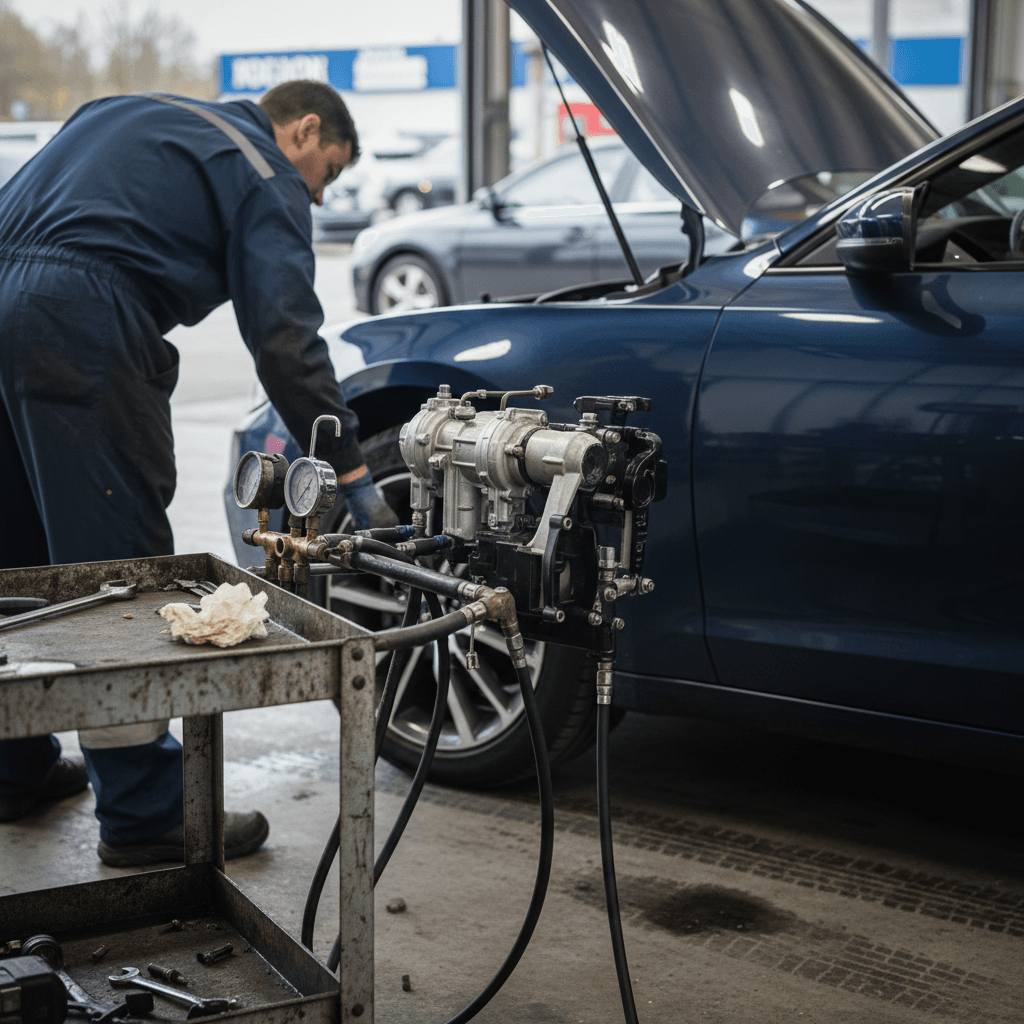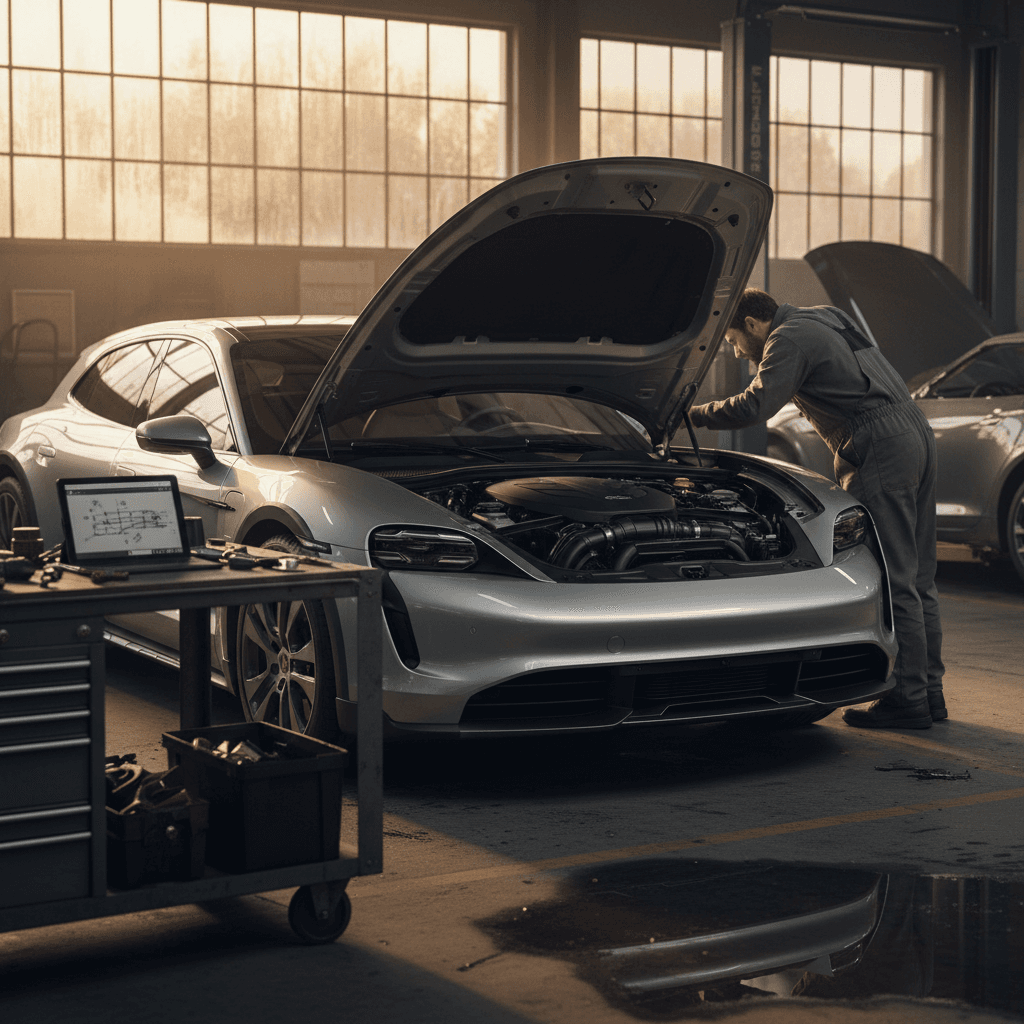If you’ve just switched to an electric vehicle, you’ve probably already Googled “EV car repair near me” and realized something: not every neighborhood shop is ready for high‑voltage battery packs and software-heavy drivetrains. The good news is that EVs typically need fewer repairs than gas cars, but when something does go wrong, you want to be sure you’re in the right bay with the right technician.
EV Repair Reality Check
Do EVs Actually Need Car Repair?
There’s a persistent myth that electric vehicles are “maintenance-free.” They’re not. What’s true is that an EV has far fewer wear items than a gas car, no engine oil, spark plugs, timing belts, or exhaust system. But your EV is still a 3,500‑ to 6,000‑pound machine riding on tires, shocks, ball joints, and brakes. It still has fluids, complex electronics, and safety systems that need the right attention at the right time.
EV Repair & Maintenance at a Glance
So yes, you’ll still visit a shop from time to time, but usually less often, and for a different set of services than you’re used to with a gas car. That’s why searching for EV car repair near me can feel confusing: you’re not just looking for any mechanic; you’re looking for one who understands electric drivetrains.
How EV Maintenance Differs from Gas Cars
What EVs Don’t Need
- Oil changes: No engine, no motor oil, one of the biggest recurring costs disappears.
- Spark plugs & ignition: EV motors don’t have plugs, coils, or fuel injectors to clog or fail.
- Transmission service: Most EVs use a single‑speed reduction gear, not a complex multi‑gear transmission.
- Exhaust repairs: No muffler, catalytic converter, or emissions components.
What EVs Still Need
- Tires and alignment: EVs are heavy and have strong torque, so tire wear can actually be higher.
- Brake service: Regenerative braking reduces wear, but pads, rotors, and fluid still age out.
- Fluids: Coolant for the battery and power electronics, and brake fluid, still need periodic replacement.
- Suspension & steering: Control arms, bushings, ball joints, and shocks are similar to gas cars.
Follow the EV Schedule, Not the Old 30/60/90 Rule
Common EV Repairs and What They Cost
When you search for electric car repair near me, what you really want to know is: what’s likely to break, and how painful is it going to be for your wallet? The answer is that most EV repairs are familiar parts, tires, brakes, suspension, with a small list of EV‑only issues that require a specialist.
Typical EV Repairs You’ll See Locally
Real-world repairs and service items most EV owners encounter, plus ballpark cost ranges in the U.S. These are estimates and vary by region, brand, and shop labor rates.
| Repair / Service | Who Can Usually Do It | Typical Cost Range (USD) | Notes |
|---|---|---|---|
| Tire replacement (set of 4 EV-rated tires) | Most tire & repair shops | $800–$1,400 | Heavier EVs and performance models need higher‑load, low‑rolling‑resistance tires. |
| Tire rotation & balance | Any tire or quick‑service shop | $40–$120 | Often free at the dealer or tire retailer; important every 5,000–7,500 miles. |
| Brake inspection & pad replacement | EV‑trained general shop or dealer | $250–$600 axle | Pads last longer thanks to regen, but rust on rotors can be an issue. |
| Wheel alignment | Most alignment shops | $120–$250 | Crucial on heavy EVs to prevent rapid, uneven tire wear. |
| 12‑volt battery replacement | Most shops, some DIY | $150–$350 | A weak 12‑volt battery is a common cause of warning lights and “dead” EVs. |
| Cabin air filter / wipers | Any shop or DIY | $50–$200 | Simple consumables, often bundled with routine checks. |
| High‑voltage system diagnosis | Brand dealer or certified EV specialist | $200–$400+ | Special scan tools and safety training required. |
| Battery cooling system service | Dealer or EV specialist | $250–$800 | Coolant changes every few years, depending on manufacturer. |
| HV battery module or pack repair (out of warranty) | Specialist only | $3,000–$15,000+ | Varies widely by brand; many issues are covered under long EV battery warranties. |
Use this table as a starting point and always ask your local shop for a written estimate.
Big Battery Bills Are Rare Early On
What Local Shops Can Handle vs. EV Specialists
When you pull up search results for EV mechanic near me, you’ll see everything from national chains to brand dealers and one‑bay independents. The trick is knowing who can safely handle what.
Who Should Fix Which EV Problems?
Match the job to the right kind of shop so you don’t overpay, or take unnecessary risks.
Everyday Wear Items
Tires, wipers, cabin filters, alignments.
Most good local shops can handle these on an EV just as they would on a gas car. The key is using the correct EV‑rated tires and following torque specs for wheels.
EV‑Savvy General Shops
Brakes, suspension, 12‑volt batteries, basic diagnostics.
Look for technicians with EV or hybrid training. They’ll understand regen braking, extra vehicle weight, and the basics of high‑voltage safety.
Brand Dealers & EV Specialists
Battery, inverter, charging issues, software faults.
Anything that touches the high‑voltage system or core EV software should go to a dealer or independent EV specialist with proper equipment and certification.
High Voltage Is Not DIY
How to Find Quality EV Car Repair Near Me
Typing “EV car repair near me” into a search bar is easy. Sorting out who actually knows their way around your car is harder. Use a deliberate process instead of just clicking the first ad at the top of the page.
Step‑by‑Step: Finding a Trustworthy EV Shop Near You
1. Start with Your Brand’s Network
Check your vehicle app or website for nearby authorized dealers and certified EV service centers. These shops have direct access to factory training, tools, and software updates.
2. Look for EV or Hybrid Certifications
Search for ASE L3 (hybrid/EV) certifications or manufacturer‑specific EV badges on shop websites. Phrases like “EV certified,” “electric vehicle specialist,” or “high‑voltage trained” are good signs.
3. Read Reviews with an EV Lens
Don’t just check star ratings. Look for reviews that mention your specific model, battery issues, charging problems, or EV brake service. That’s your proof they’ve done it before.
4. Call and Ask About Your Model
A quick phone call tells you a lot. Ask, “How many <strong>[your EV model]</strong> vehicles have you serviced?” and “Do you have the scan tools to work with my car?” Clarity and confidence are green flags.
5. Confirm Parts and Warranty Handling
If your EV is under warranty, ask whether the shop can process warranty claims or if you must go to a dealer. For out‑of‑warranty cars, ask if they use OEM or high‑quality aftermarket parts.
6. Get a Line‑Item Estimate
Before dropping off your EV, get a written estimate that breaks down diagnosis fees, labor hours, and parts. This makes it easier to compare one shop with another and avoid surprises.

Questions to Ask Any EV Repair Shop
A good EV shop won’t be offended if you ask pointed questions, it’s a sign you care about the car and safety. Here are conversation‑starters that separate true EV pros from generalists who are still learning the ropes.
- Do your technicians have any EV‑specific certifications (ASE L3, OEM training, etc.)?
- How many EVs, and how many of my model, do you service in a typical month?
- What’s your process for working around high‑voltage components?
- Which services can you perform in‑house, and which require a dealer or specialist?
- Can you share sample pricing for common EV services like brake service, coolant changes, or diagnostics?
- Do you offer digital inspections with photos or videos so I can see what you’re recommending?
- How do you stay current on EV software updates, recalls, and technical service bulletins?
Trust Your Gut, Too
Keeping Repair Costs Down on a Used EV
Used EVs have become some of the best deals in the market, thanks to falling prices and the fact that depreciation hits hardest in the first few years. The key to keeping your repair bills reasonable is knowing the car’s history and watching battery health over time.
Four Smart Habits for Affordable Used‑EV Ownership
Simple moves that make your search for EV car repair near you less frequent and less expensive.
Get a Battery Health Report
The traction battery is the heart of an EV. Before you buy, and then periodically afterward, get a professional battery health assessment.
If you’re shopping on Recharged, every vehicle includes a Recharged Score Report with verified battery diagnostics, so you’re not guessing about the most expensive component on the car.
Match the Car to Your Driving Pattern
Short‑trip city driving is easy on most EVs. Frequent DC fast charging, towing, or extreme‑climate use can be harder on the pack.
Pick a used EV whose history and range already fit the way you drive so you’re not constantly pushing the limits.
Stay Ahead of Maintenance
Schedule tire rotations, alignments, and brake inspections on time. This is where most EV repair costs hide, especially on heavier crossovers and trucks.
Keep Warranties and Coverage Straight
Know exactly when your battery and powertrain warranties expire. If you’re buying from a dealer or marketplace, ask about extended EV coverage that includes battery cooling, inverters, and charging hardware.
Budget for Tires First
How Recharged Helps With EV Repair Confidence
One of the biggest anxieties buyers have about used EVs is, “What happens if something expensive breaks?” At Recharged, the entire buying experience is built to answer that question before you ever sign paperwork, so your future search for “EV car repair near me” is a planned maintenance visit, not a panic.
Verified Battery Health & Fair Pricing
- Every vehicle on Recharged comes with a Recharged Score Report that includes verified battery diagnostics, not just a quick test drive.
- We price cars based on real‑world battery condition and market data, so you’re not overpaying for a pack that’s already past its prime.
- Understanding the battery up front makes it easier to budget for realistic long‑term maintenance instead of speculative worst‑case scenarios.
Guidance from EV Specialists
- EV‑specialist support: Our team talks you through what a specific model typically needs in terms of service and repair.
- Financing and protection: We can help you compare financing and coverage options that make sense for EV ownership.
- Nationwide experience: Because Recharged serves buyers across the U.S., we understand where EV‑ready service networks are strong, and where you’ll want a plan in place before you buy.
Local Help, Digital Experience

EV Car Repair Near Me: FAQ
Frequently Asked Questions About EV Car Repair
You don’t need to be a technician to make smart decisions about EV car repair near you. You just need to know which repairs are routine, which demand an EV specialist, and how to vet the shops that show up in your search results. Modern EVs are built to need less service than gas cars; pairing the right vehicle with the right repair network, and, ideally, a verified battery report from a partner like Recharged, turns EV ownership into something predictable instead of stressful.

